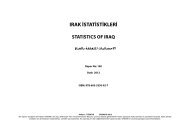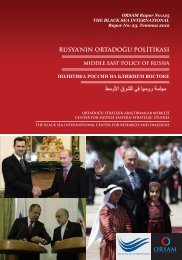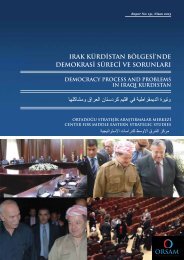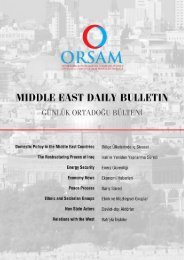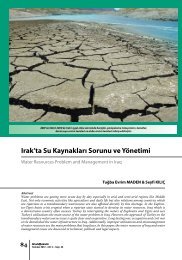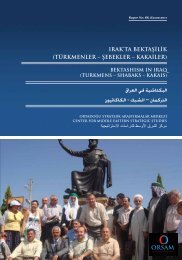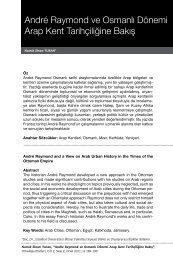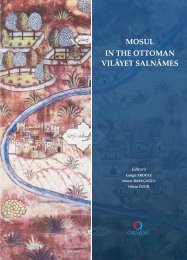30 July - 5 August 2012 - orsam
30 July - 5 August 2012 - orsam
30 July - 5 August 2012 - orsam
You also want an ePaper? Increase the reach of your titles
YUMPU automatically turns print PDFs into web optimized ePapers that Google loves.
Global warming threatens to exacerbate these potential food security risks, further undermining the<br />
region‘s political and economic stability. The International Food Policy Research Institute calculates<br />
that the combined constraints of decreasing water availability and increasing climate change could<br />
diminish regional crop yields 7-10% by 2050. To offset this drop and keep pace with mounting<br />
demand, the Arab world will need to import 45-62 million metric tons of cereals. But climate change<br />
will impact agricultural production worldwide, increasing global food prices. By mid-century, wheat<br />
prices could double due to the impact of climate change. Because they are so dependent on imports,<br />
Arab nations are especially vulnerable to such price shocks. In Egypt, for example, the World Bank<br />
estimates that a <strong>30</strong>% jump in food prices results in a 12% increase in poverty.<br />
Booming urbanization further amplifies the region‘s environmental challenges. Propelled by rapid<br />
rural-to-urban migration, the Arab urban population has quadrupled in the past 40 years and will<br />
double again in the next 40. Jordan and Libya now figure among the most urbanized countries in the<br />
world with four-fifths of their people living in cities. This urban growth also fuels greater demand for<br />
energy, food and water, sometimes overwhelming local infrastructure capacities.<br />
While the region‘s environmental risks are significant, imaginative approaches to these challenges<br />
can offer valuable opportunities. Practical policies to alleviate environmental problems can<br />
simultaneously generate employment and spur economic growth, if designed and implemented<br />
properly. From agriculture to energy to tourism, transforming these traditional sectors into a ―green‖<br />
economy holds the dual promise of job creation and environmental sustainability. A 2011 report by<br />
the Arab Forum for Environment and Development (AFED) outlines a detailed strategy for<br />
developing ―green‖ economies. Numerous sectors are profiled in the report including:<br />
<br />
<br />
Construction — ―Greening‖ just one-fifth of the Arab world‘s construction stock and<br />
retrofitting buildings to enhance energy and water efficiency, would create 4 million jobs and<br />
pay for itself in 2-7 years by trimming costly resource consumption.<br />
Waste Management — Adopting green methods for waste management including reuse,<br />
recycling and recovery would save Arab countries $5.7 billion annually. It would create jobs<br />
given the labor intensity of these practices, as well as stimulating new industries that would<br />
evolve both upstream and downstream.<br />
Page 12




